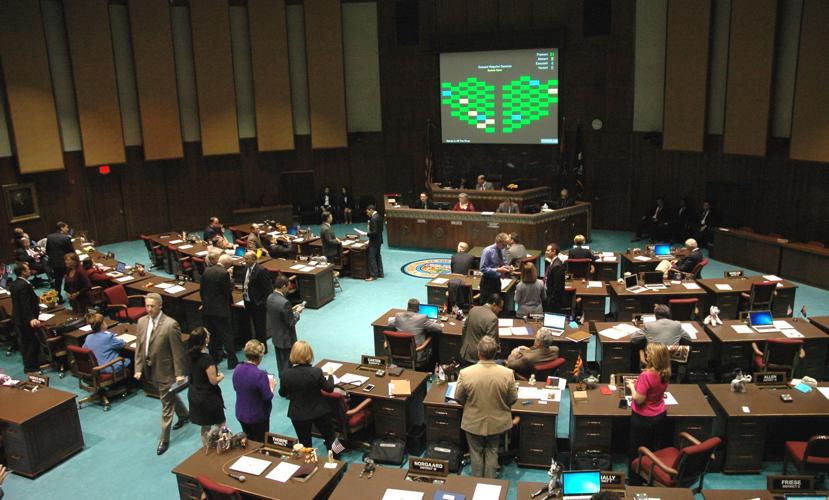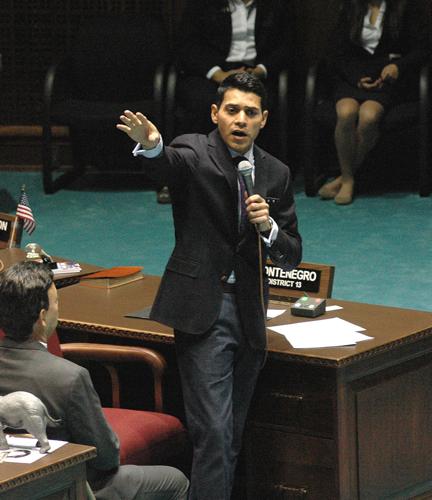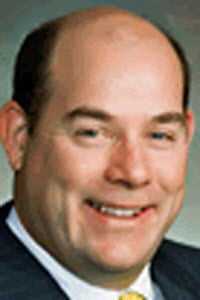PHOENIX — Claiming it’s a matter of security, the state House on Thursday banned reporters from the floor who would not consent to extensive background checks.
Several media organizations who routinely cover the Legislature, including The Associated Press, the Arizona Republic, the Capitol Times and Capitol Media Services were denied the traditional access after refusing to sign documents allowing House staff to check not just criminal history records but all civil records, driving records and other public records.
House leaders said similar documents would need to be signed by any other reporter coming to the Capitol for the day who also wanted floor privileges, which have traditionally been granted for more than three decades.
Even Rep. Bob Thorpe, R-Flagstaff, who said he supports some scrutiny of who has floor privileges, said that seemed unnecessary.
“I don’t think we need to go through these folks’ background with a fine-toothed comb, with a microscope,” he said.
But the policy went beyond the checks, listing specific criminal offenses which would automatically disqualify a reporter from having floor privileges, including misdemeanor offenses like trespass.
Speaker David Gowan, R-Sierra Vista, said it was not targeting the media but about keeping lawmakers safe. He cited a disturbance last week, not at the press tables in the secure area of the House but in the public gallery.
But several Democrats openly scoffed about the claim of those concerns for their safety, pointing out the recently revealed news that Gowan was allowing lawmakers to carry concealed weapons on the floor.
Rep. Lela Alston, whose legislative experience goes back to 1977, said she’s never felt at risk from the public. And Alston said she weathered some high-tension times such as the impeachment hearings in the 1980s against Gov. Evan Mecham.
Alston said her worries are a bit closer to her.
“I want to know how I’m going to be safe on this floor,” she said. Alston said she wants a list of lawmakers who Gowan has allowed to be armed.
“I would like to know about that so I know, when in times of tension, who I need to stand away from,” she said.
House Majority Leader Steve Montenegro, R-Litchfield Park, said it’s all about ensuring that those who have access to the secure areas of the House have been properly screened. But House Minority Leader Eric Meyer, D-Paradise Valley, pointed out the requirement for a background check does not apply to individuals who House members can invite into the secure area and onto the floor.
Rep. Reginald Bolding, D-Laveen, suggested that the new regulations have less to do with security than with the discomfort of some lawmakers with what reporters have been writing. And that, he said, includes reports on state-paid travel.
That is a reference to an extensive story earlier this year by Hank Stephenson of the Arizona Capitol Times about Gowan’s travels at state expense, much of it in the congressional district where he wants to get elected.
Gowan eventually had to repay the House more than $12,000. Late Thursday, the attorney general’s office confirmed it was conducting a “thorough investigation” into what Gowan, who had sought the probe, insisted was an innocent mistake.
Ginger Lamb, the paper’s publisher, noted the list of disqualifying crimes like rape and assault also included trespass. And Stephenson has a 2014 conviction for trespass, the result of a fight in Wickenburg.
Lamb called the timing of the speaker’s action “peculiar.”
“This new protocol would have an adverse effect on a member of our reporting team that has written several stories that are critical of the speaker’s leadership,” she said in a prepared statement. “I would hope this is coincidence, but past experience leads me to believe otherwise.”
The speaker denied the policy has anything to do with any specific reporter and any specific story. Instead, he said it stems from a disturbance last week in the House gallery by protesters.
The gallery is a public area that does not require badge access. The protests followed a meeting of the House Elections Committee over problems with the March 22 presidential primary, a meeting at which many were denied a chance to speak.
And Gowan said it also has nothing to do with the media at all, saying the policy covers covered all “nonemployees” who have access through key cards to the House floor “so that we know who people are, come in, so that our members are protected.”
“I don’t understand the crisis here,” he said.
But House Counsel Robert Ellman, in a March 31 memo to Gowan obtained by Capitol Media Services, said “nonemployee badge holders are generally if not exclusively law enforcement officers and reporters.”
Gowan conceded under questioning that in the last 34 years there has never been an incident involving a reporter granted floor access. But the speaker said that’s irrelevant.
“There had never been an attack on 9/11 either, like that occurred either, before on our shore,” he said. “But it did.”
And he repeated his concerns about the protests, all of which occurred in non-secure areas.
“You got people locking themselves to doors,” Gowan said. “You got somebody up here (in the gallery) who held onto a seat, wouldn’t even let the troopers pull him out.”
And he said other protesters were “collapsing” on the troopers.
“That’s pretty scary,” Gowan said.
Montenegro said the press has not been locked out of the House. He said as long as reporters agree to the background checks their floor privileges can be restored.
And he pointed out reporters, like all members of the public, can watch from the third floor gallery. But that cuts off the traditional access reporters have to lawmakers before and after the floor to question them about their comments, bills and amendments.
Much of the debate, which took more than an hour, was about the juxtaposition between Gowan’s stated concerns about the safety of lawmakers and comments by House members about their colleagues being armed.
Rep. Randall Friese, D-Tucson, said Arizona law makes it a crime to bring a weapon into a public building where there are signs forbidding that.
“This building has such a notice on the front door,” he pointed out.
But House majority publicist Stephanie Grisham said the speaker removed a similar sign that used to be on the back door of the House, the one often used by lawmakers. That, she said, means legislators are not breaking the law.
Rep. Kelly Townsend, R-Mesa, hinted she’s one of the legislators who is armed. But she said it’s necessary — though she said it’s more likely to come from the public gallery, as there are no metal detectors in the House.
“If someone stands up here and decides they’re going to open fire, they will know, at least after today, that they’re not going to be alone, the only person carrying a weapon, that there will be more than one here on this floor that will fire back,” she said. “And that, members, brings safety to this body.”







